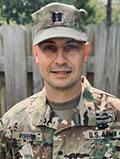
As we Americans look ahead to a long Fourth of July weekend, this is often a time when the nation’s thoughts turn to the members of our military forces who have the responsibility to protect our precious freedoms. For me, this year’s holiday is especially meaningful, as I prepare to be deployed sometime this year in a very different and challenging role: as a certified registered nurse anesthetist (CRNA).
I had enlisted in the U.S. Army the month before 9/11, and served over a period of eight years in both Iraq and Afghanistan before making the transition to become an officer and a nurse. After spending my initial years in the Army learning and practicing how to inflict maximum harm on others, I now had an intense desire to give back and to heal people.
Initially my goal was to become a critical care registered nurse, but then one day in my undergraduate nursing school, a military CRNA came to speak to us. I had no idea that this specialty even existed, but as he spoke about the autonomy and responsibility that is at the heart of being a CRNA, I knew that I wanted to acquire the advanced training and skills that would enable me to provide anesthesia effectively and safely to our soldiers in the field.
In my new deployment, I will be the sole anesthesia provider within a several hundred mile radius, with a focus on life-saving and resuscitative surgery in collaboration with general and orthopedic surgeons. I am confident to take on this role because of the extensive training required to become a CRNA. I received my Masters in Nurse Anesthesia from the University of South Florida over two-and-a-half incredibly rewarding but grueling years.
Overall, CRNAs are required to have a minimum of seven to eight years of education, training and experience. For me, hands-on clinical experience in hospitals and other care settings was an integral part of my training and placed a strong emphasis on working autonomously. Just like in the military, my CRNA training instilled in me the mindset that I may be the one, solitary person who others are depending on to protect and save their lives—and that I’d better be prepared to get the job done as an army of one.
Even as I look forward to my new CRNA role, I know that here in Florida, my fellow CRNAs are facing an important challenge. Well over half of the states in our country allow CRNAs to practice autonomously, with no requirements for supervision by a physician. Florida, however, has not yet modernized its laws to allow CRNAs to practice independently to the full extent of their training and expertise.
I fully support removing barriers to independent practice for CRNAs in Florida. From a patient’s perspective, CRNAs play a unique role in the quality of surgical care. Patients are often filled with anxiety prior to surgery, and we have the bedside acumen from our years of intensive care experience to calm their fears and earn their trust.
CRNAs also play a critical role in expanding access to care and making care more cost-effective. By enabling CRNAs in Florida to operate independently at the full scope of their practice, healthcare facilities can choose the model of anesthesia delivery that best meets their needs. This is especially important for community, rural and critical access hospitals faced with severe financial challenges.
Today’s CRNAs are the primary providers of anesthesia care in rural America, to maternity patients, in the Veteran’s Administration and U.S. military, and in many medically underserved inner-city communities.
As we mark this Independence Day, let’s take a moment to remember all of the skilled professionals -- both military and civilian -- who help keep us safe and well, whether it’s on the battlefield or here at home. From my own personal perspective, I can say it is an honor and privilege to serve this great country.
Matthew Popejoy of Tampa is a certified registered nurse anesthetist and Captain in the U.S. Army Reserves


